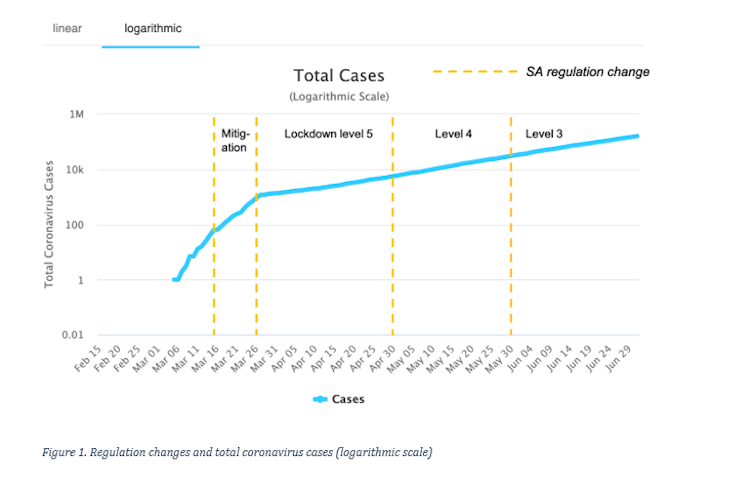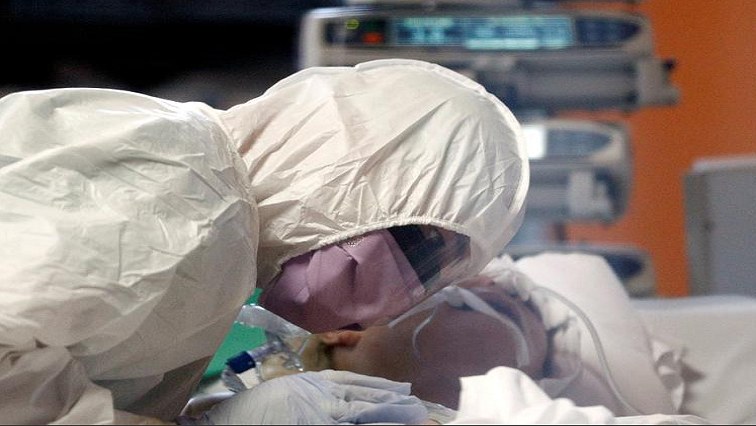South Africa is now ranked 5th in the world for COVID-19 active cases, 9th for cumulative cases, and 23rd for cumulative deaths.
The nation’s leadership was initially widely praised for reacting decisively and early by implementing stringent lockdown regulations. These have been successively eased since they became unsustainable.
The president has recently announced new regulations. Some, like the ban on alcohol sales, are designed to alleviate the burden on the healthcare system. These make sense. But those regulations designed to slow transmission do not. They are variations on familiar themes: curfews, continued restrictions on social and economic activities, regulations on taxi operation, and similar.
Regulation is entirely the wrong approach. Lockdown failed in South Africa, despite its huge cost. The emphasis should never have been on imposing restrictions. It should have been on asking people in different parts of the fantastically complex mosaic of South African society to participate in coming up with solutions.
People know their own way of life, and can identify solutions that work for them. Even if there are none, we all deserve a say in how to balance the risks we face. There is no avoiding the coming storm, but the country can prepare for it by settling on a strategy informed by realism – about what has and hasn’t worked, and about what is feasible in South Africa.
What hasn’t worked
It is obvious that lockdown failed to avert the current situation, since we are in it. It is less widely appreciated that there were no changes in the trajectory of COVID-19 either during the locking down or in the unlocking phases. The infection rate, viewed on a logarithmic scale (because the linear scale makes changes harder to spot), is roughly a straight line from about 28 March onwards. That was Day 2 of lockdown – far too soon for an effect. This means that the reproduction number has remained approximately the same for over three months. (Deaths look similar, with a time lag.) This is obscured on a linear scale, because it is hard to spot changes in a curve. But when viewed with a logarithmic y-axis, it is obvious that the line is approximately straight. Lockdown didn’t make a difference, and nor did unlocking, as Figure 1 shows.

South Africa’s current predicament is a continued, steady growth in incidence rate. This on the back of the huge socioeconomic impact of lockdown:
- decimation of the economy;
- loss of employment and livelihoods;
- collapse of many small, micro and medium-sized businesses;
- growing hunger;
- disruption to important existing health programmes; and
- enormous psychological pressure felt by nearly everyone in the country.
Given these consequences, the last thing South African lawmakers should be considering is a further lockdown.
So is the country out of options?
Not exactly.
Ask the people
The road not taken was a considered mitigation strategy, instead of a copycat approach – one that persists as the country unlocks in step with the rest of the world.
The approach, advocated unsuccessfully by some both before and nearer the time of locking down, is to identify context-specific measures that result in reduced infection rates while permitting as much normal activity to proceed as possible.
How does one devise a context-specific mitigation strategy? One doesn’t. Instead, one asks the people who actually live in that context.
Some months ago, I was involved in making a documentary about the effects of lockdown in low-income settings. Interviews were conducted with people living in poverty in both urban and rural settings in Uganda, Malawi, Zambia and India. The common thread in these interviews was their frustration at not being heard.
Most of them feared starvation more than COVID-19. Something else was apparent too. Several people had their own ideas about how to deal with the threat.
In particular, the leadership of a Malawian village came up with a solution to protect older people by locating them in one part of the village. Malawi never locked down but, with a very poor population, half of whom are 17 or under, it is really not clear why it should. Had Malawi’s then-leaders consulted, they might never have suffered the ignominy of having their obviously inappropriate lockdown regulations thrown out by a court.
The road not taken, then, is consultation. It sounds watery, but it’s not. Humans are problem-solvers: that’s our special skill. But we have to know what the problem is, and what tools are available in the context. So long as the people who understand the problem don’t talk to the people who know the context, the chances of solutions are small.
It’s not too late. South Africa’s best bet now is to provide communities with accurate information about how COVID-19 spreads and whom it threatens, exactly as happened in the interaction in Malawi, and then ask them what they want to do about it.
Different steps for different circumstances
Nobody wants to catch coronavirus, and people will take reasonable steps to avoid it. But in this most unequal of countries, those steps will be quite different for different people.
For an office worker living in the suburbs on an uninterrupted salary, working from home and having food delivered and avoiding public places makes sense.
Waste-pickers, hawkers, restaurateurs, taxi-drivers, hairdressers, and domestic workers all live differently. They are all exposed to different risks. They are also faced with different imperatives against which to balance those risks.
By consulting communities, government would also begin the process of rebuilding trust, which was squandered in the attempt to enforce a strategy that was obviously impossible here.
“Suppression” of the virus, as defined in the influential report from Imperial College London, is the reduction of the reproduction number below one, achieved by a 60% reduction in social contact.
That was never on the cards for South Africa. And ordinary South Africans knew it.
South Africa’s initial response to COVID-19 was confident, but wrong. Now it has stalled. But the country is not out of options. The trick is for the chattering classes to stop telling each other what the solution is, and instead ask some of those who haven’t been heard. The leaders have had their chance. It’s only fair that the people have a go.
It’s unlikely they will perform worse.![]()
Alexander Broadbent, Director of the Institute for the Future of Knowledge and Professor of Philosophy, University of Johannesburg
This article is republished from The Conversation under a Creative Commons license. Read the original article.


